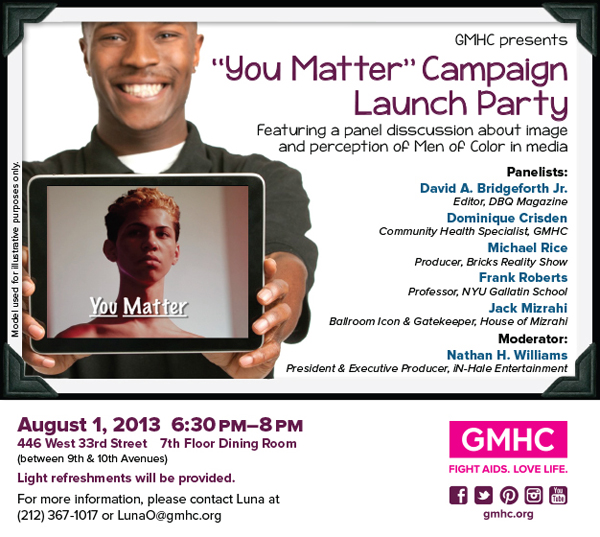"You matter" is what a group of young people from Club1319, a prevention program at GMHC, are saying to other LGBTQ youth in a new social marketing campaign. The campaign features three short videos -- 30 seconds each -- that provide vignettes of young gay or transgender youth going through a "moment" that might challenge their identity or sense of worth. The videos, called "Closet," "Beauty," and "In the Moment," move from high points to low points of everyday experiences for kids and all end with an affirmation that no matter how positive or negative a situation may be, "you matter."
"Closet":
"Beauty":
"In the Moment":
The idea emerged when some of the youth from the Club1319 program came together with GMHC staff and video director Amy Hart to explore messages that could be meaningful to LGBTQ teenagers, especially young men of color. The teenagers talked about physical appearance, depression, difficulty finding jobs, education, drug addiction and suicide. At one point Justin, a tall boy with curly, copper-colored hair, said, "You matter." This phrase began to guide the conversation, which led to how to affirm self-worth in the face of hard challenges. As they talked, they kept repeating the phrase again and again as they imagined half a dozen vignettes based on familiar experiences.
"You matter" is a theme that can resonate with kids whose everyday lives are marked by frequent anxiety and fear. It starts with the very real possibility of rejection by their friends and families. LGBTQ kids are often beaten or even thrown out of their homes to fend for themselves on the streets. For youth of color, pressures of poverty and racism impact their daily experience. Unwanted and arbitrary police attention is a constant fact of life for youth of color, and the experience is heightened for LGBTQ youth, whose sexual orientation and expression of identity provide other sources of marginalization in contemporary American society.
Even as our society is moving toward a broad acceptance of LGBTQ people and marriage equality, hate crimes and gay suicide rates continue to spike. New York, which many see as a "mecca" for LGBTQ persons, is no less subject to these trends, and in 2013 hate crimes against LGBTQ persons in the city increased by 70 percent compared with the year before. On May 17, at the same time that the Club1319 youth were working on the "You Matter" videos, a gunman shouting anti-gay slurs killed Mark Carson, a young gay man of color, in Greenwich Village. The killing, only the latest in a string of anti-gay hate crimes across New York City this year, reverberated throughout the community, with emotional vigils and memorials in the wake of the tragedy.
All this adds up to a burden of stigma that is, at times, unbearable for our youth. Depression, drug use, and suicide are commonplace risks in the face of this, but the perils for LGBTQ youth go much further and include contracting HIV and other sexually transmitted infections, homelessness, transactional sex, crimes of survival, dropping out of school, and other actions. In the CDC's survey of behavioral risk among American teenagers, lesbian, gay, and bisexual youth (the CDC did not collect separate data on transgender youth at this time) were shown to experience dramatically higher levels of risk than their straight counterparts on over 70 different risk behaviors surveyed. These include more obvious factors such as carrying a weapon to school, drinking and driving, or drug use, as well as lesser-known factors such as eating habits related to obesity or diabetes, exercise, or wearing a bicycle helmet.
GMHC's Club1319 was created to provide an affirming, positive space for youth who are gay, bisexual, or transgender. Over the past three years the club has provided a daily drop-in center where kids have access to a library and a computer center managed by agency staff who grew up in the community and can speak from experience on how to navigate the challenges of growing up gay in New York.
The program has created several social marketing campaigns aimed at young gay and bisexual men of color, most notably the "Kiss and Tell" campaign of 2011 to 2012. The campaigns are always conceived by the program youth, and GMHC has been able to bring in professionals to help shape their message and bring it to the public. For "Kiss and Tell," celebrity photographer Mike Ruiz offered his services pro bono, and the resulting campaign spent four weeks on telephone kiosks around New York City during June 2012 (Pride Month) and generated a lot of publicity. As an example of the creative process that the program youth engage in, "Kiss and Tell" was their response to "don't ask, don't tell," which had not yet been repealed at the time that they created the campaign. With "Kiss and Tell" the youth sent a positive message about transparency and communication in intimate relationships.
For "You Matter," GMHC recruited Ms. Hart, an award-winning filmmaker with both local and international experience working on public health-related themes. Hart worked with the program youth to build out their concepts into the 30-second pieces that are available on Facebook and YouTube.
"You Matter" launches Thursday, Aug. 1, 2013. At the launch event (see flyer below) we will debut the three "You Matter" videos, with appearances by the cast and crew. This will be followed by a panel discussion, "Our Self-Portraits: A Community Conversation on Image and Perception of Black Gay Men in the Media," moderated by Nathan H. Williams and featuring David Bridgeforth, Dominique Crisden, Michael Rice, Frank Roberts and Jack Mizrahi as panelists. After the discussion there will be an opportunity for people to make their own videos to say, "I matter because...." The videos will then be posted on YouTube.
LGBTQ youth believing that they do matter is a successful step toward building a better future today for youth. And all communities will reap the benefits of youth who are thriving rather than just surviving life.
